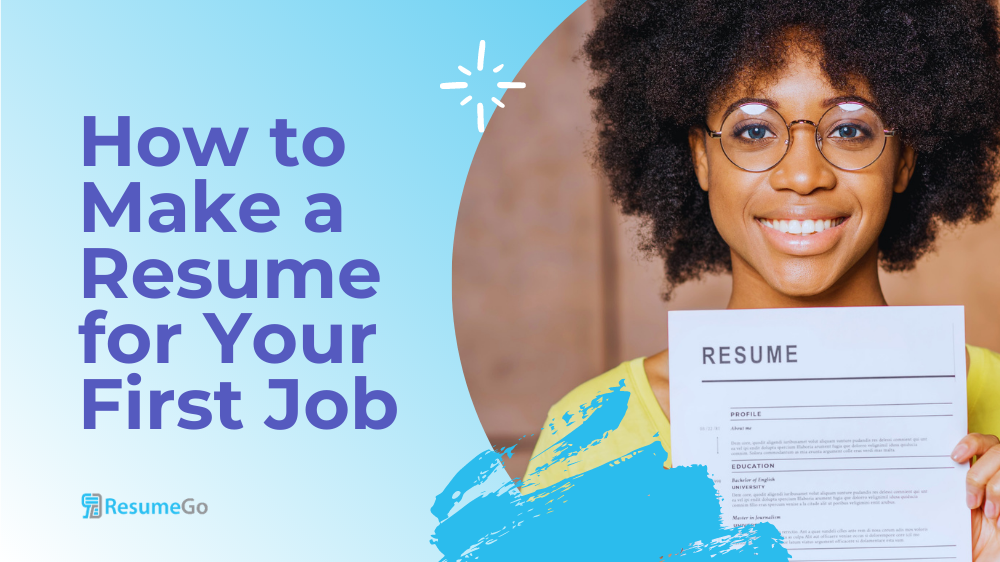How to Make a Resume for Your First Job
So, you’ve made it through school, maybe have some internship experience under your belt, and you’re ready to apply for your first real job. How do you get started on how to make a resume for your first job that will set you apart from other new graduates who are anxious to get their start in the world?

The first tip is to constantly revise your resume and read through your revisions to fix your resume mistakes. There are tips below on how to craft a basic resume, but you will want to slightly adjust the wording of different sections as you apply to different jobs and want to emphasize slightly different areas of experience or expertise. It may take a little extra time, but it will pay off in interview requests.
Formatting
As a new graduate, your resume should be one-page long. Like your professors, future employers know all the tricks about filling up a page with large fonts, generous margins, and double spacing, so this is not the area for you to get creative. Fonts should not be larger than 12-point, margins should be 1-inch all around, and although you can add spaces between sections, the rest of your resume should be single-spaced.
Unless the job listing says otherwise, submit your resume, cover letter, and attachments in PDF format. This will ensure that the look of your documents stays consistent and that anyone with any operating system can read them.
Structure
Although you may have some internship experience, your best positioning as a less-experienced worker is to tout your skills and potential. Therefore, you may want to consider using a functional resume structure rather than the traditional chronological format. A functional resume includes the following sections:
- Resume Objective or Summary: This should be a three-line paragraph about who you are and what you want to do professionally. Emphasize your unique advantage for this job. For instance, if you were applying to a job at TED Talks: “New graduate passionate about the power of stories seeking opportunity to leverage tech skills to inspire change. Highly proficient in Adobe, Final Cut Pro, and Amara captioning.”
- Skills or Areas of Experience: Simply list some of your professional skills, whether it is software you know (e.g. MS Office Suite) or some basic proficiencies (e.g. customer service or data entry). You will want to include at least five items on this list, but depending on the space you have, you can probably list up to 15. Prioritize the items in the list based on how unusual those skills are – those can be deleted as you increase your skills and are applying for higher-level positions.
- Achievements or Expertise: What are three things that you are really good at? These can be professional personality qualities as well as skills. This is where you can highlight them and use examples from your past work, school, and extracurricular experiences. For instance, if you think of yourself as a “Self-Starter” you might use a description that references that you founded an Archery Club at your school, spearheaded a petition to reverse a ferret ban in your town, or successfully lobbied for a more lenient uniform policy at your high school job.
- Employment History: Only now do you talk about your past work experience. List your title first, the name of the company, the city, and state where the job was based, and the month and year you started and ended the job. List two to three bullet points describing what you did at the job, even if it has nothing to do with the job to which you are applying. Since you are a new graduate, employers understand that you will have work experience in retail, food service, or other jobs that may not relate to their field. Some employers even seek out applicants with recent customer-facing experience because they think it proves that you have “paid your dues.”
- Education: If you have a bachelor’s degree, begin your education history there. If you are still getting your degree or have an associate’s, list your high school as well. If your major or coursework closely relates to your desired job, you can list this as well (so “Advancing Coding” would make sense for a tech job, but “European History: Napoleon’s Last Stand” would not). Only list your GPA if you received a 3.9 or higher and have graduated less than 12 months ago.
As you make your resume for your first job, highlight where you might be using the same vocabulary multiple times or where you can use more action words to better illustrate your work. And above all – proofread your resume before you send it out. Run it through a grammar- and spell-check, just to be safe. You don’t want to miss out on your dream job because of a minor error.
Applying for the first step in your career path can be exciting and nerve-wracking. These tips will help you put your best foot forward to land your first job in which you can thrive.